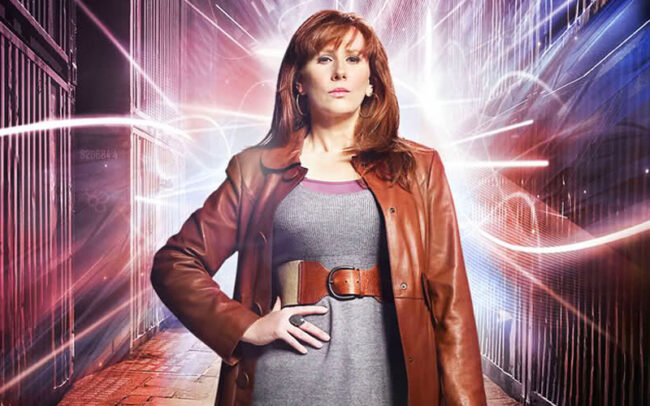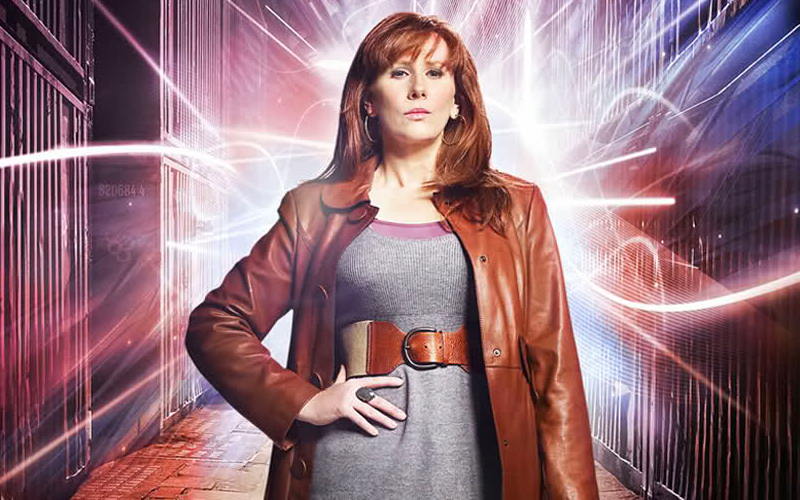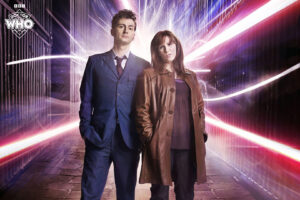
I will confess, I am a total Donna Noble fan (and have been for some time). So prepping for the 60th Anniversary Doctor Who specials by rewatching the Donna Noble season was a task I readily welcomed.
After endless ages in Doctor Who S1-2 of the Holy Beloved Rose Tyler, and the weirdly abortive S3 “oh, she’s falling for the Doctor, too” tenure of Martha Jones, having a Companion for S4 that was (a) out for a good, interesting time, (b) not falling on love with the Doctor, (c) sassy and independent, (d) definitely not falling in love with the Doctor, (e) nagged by an inferiority complex, and (f) oh so very much not falling in love with the Doctor, was like a breath of fresh air.
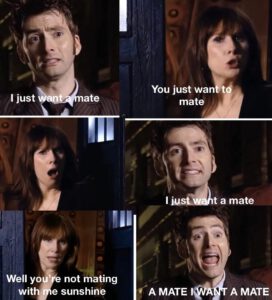 The chemistry between David Tennant and Catherine Tate was lovely. The dynamic of a Companion who wasn’t cowed or dominated or (as noted) smitten with the Doctor was delightful. There was humor, there was terror, there was so much of an EveryPerson about Donna, that every moment in her early tenure was a delight.
The chemistry between David Tennant and Catherine Tate was lovely. The dynamic of a Companion who wasn’t cowed or dominated or (as noted) smitten with the Doctor was delightful. There was humor, there was terror, there was so much of an EveryPerson about Donna, that every moment in her early tenure was a delight.
Her first encounter, in the S3 “Runaway Bride” gave us a person-on-the-street encounter with the weirdness of the Doctor. “Partners in Crime” shows both how that encounter has changed her and how the Doctor (a lesson that holds true for every regeneration, but particularly for Ten) absolutely needs a Companion. That’s reinforced in “Fires of Pompeii,” showing how the Doctor’s hit-and-miss adherence to the rules, like a good little Time Lord, can lead to moments of amoral inhumanity, and in “Planet of the Ood” gives the Doctor a boost in the moral outrage over that race’s slavery.
Donna gets pushed a little to the side with a standard alien invasion in “The Sontaran Strategem” and “The Poison Sky,” and, for obviously reasons, continues to play support in “The Doctor’s Daughter.” But she’s back on stage for the Agatha Christie “The Unicorn and the Wasp.”
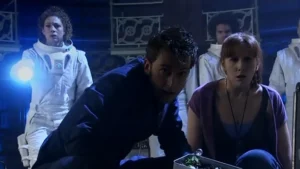
After what is, at that point, a pretty normal Doctor Who season (a few invasions, some weird planets and historical pieces), S4 becomes nightmarishly dark. I would say that “Silence in the Library” and “Forest of the Dead” are the scariest bits of the season, if not for the Twilight Zone-perfect “Midnight,” but Donna remains a presence — her phantom family drama in the Library two-parter makes up for River Song’s introduction pushing her a bit to the side, and her grounding of the Doctor after a very, very unpleasant encounter in the worst parts of human nature are critical parts of what make those episodes work.
All of which leads to an even darker tale in the first of the three-ep season wrap, “Turn Left,” where we see what the world — and, by extension, the lives of Donna and her family — becomes if she never takes the step that brings her to meet the Doctor. It’s an hour of progressive dystopia with shades of Alan Moore’s V for Vendetta, as the various disasters and plots that the Doctor averted over the course of S3-4 actually come to pass when Donna’s not there to pull the Doctor back in “The Runaway Bride.” After the horror of the Library saga and the psychodrama of “Midnight,” “Turn Left” just becomes horribly depressing (with a frisson of horror from the bug on Donna’s back).
Throughout it all, though, Donna remains — if not positive, then resolute. Capable of outrage. Determined to make things better. Self-deprecating, but willing to step up for a fight. She is utterly human and utterly a force of nature.
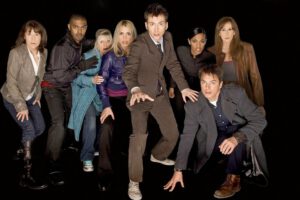
That brings us to “The Stolen Earth” and “Journey’s End,” as Donna lets herself be recruited to save the world. The pair of episodes carries a massive, sometimes almost overwhelming amount of fan service, drawing in every NuWho Companion and hangers-on, including key cast members of Torchwood and Sarah Jane Adventures, into a massive, multi-layered conspiracy by and battle against the (of course) Daleks.
Through this, it would be easy for Donna to fade a bit into the background, but she’s a key, if controversial, part of the plot. By the end of things, she’s proven herself, the “Temp from Chiswick,” to be the most important human in the universe … and is, for Reasons, demoted into amnesiac former Companion, unaware of what she’d seen, done, accomplished.
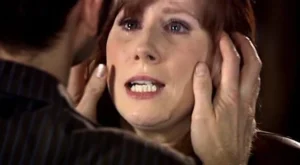
It feels outrageously, massively unfair to the character, of course (esp. as Martha heads off to new possible adventures, and Rose ends up with her mom and the Man of Her Dreams, sort of). It’s still gut-wrenching to watch (even as it includes the meme-worthy “David Tennant in the Rain” scene), but, aware how much of it must have been driven by Catherine Tate’s contract (she had a successful career both pre- and post-Who) and the winding down the Russell Davies era, it’s actually a far better ending than “Oh, I’m tired of / traumatized by / unrequited about traveling with the Doctor, so I quit” (which is pretty much what sort of happened with Martha, and with a number of Companions over the decades). It hurts like hell, but it’s also a tribute to the character at the same time.
And where did things go from there? Lacking Donna, the Tenth Doctor goes into what turns into a self-destructive spiral ending with him (and the showrunner) regenerating into Matt Smith’s Eleven and Steven Moffat — accompanied by increasingly Mary Sue-ish Amy Pond and Clara Oswald.
Which, of course, brings us a few Doctors along (Peter Capaldi’s gruff rock star Twelve, and, under Chris Chibnall, Jodie Whittaker’s lovely Thirteen) to the 60th Anniversary specials, with David Tennant somehow becoming the regeneration into Fourteen and (we are told) Catherine Tate back as Donna. How will that work? Well, yeah, I’m a day or two late in watching, but I’m very eager to find out.
